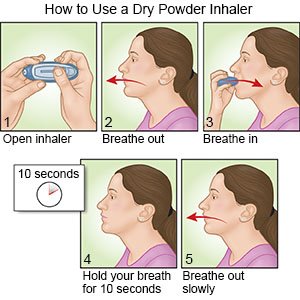How to Use A Dry-Powder Inhaler
Medically reviewed by Drugs.com. Last updated on Apr 6, 2025.
What is a dry-powder inhaler?
A dry-powder inhaler is a handheld device that delivers a dose of medicine as a powder when you inhale. You breathe the medicine deep into your lungs to open your airways.
How do I use a dry-powder inhaler?
Some dry-powder inhalers require you to put the medicine inside the inhaler. Others come with the medicine already inside.
- Follow the instructions to put together your inhaler, and get it ready to use. Open the inhaler mouthpiece, or remove the cap.
- Check to make sure there are no foreign objects in the mouthpiece.
- Breathe out fully, away from the inhaler. Never exhale into your inhaler.
- Hold the inhaler as directed. Do not cover the vents. Place the mouthpiece between your lips tightly to create a seal.
- Breathe in strongly for as long as you can to make the medicine come out.
- Hold your breath for about 10 seconds. Breathe out slowly, away from the inhaler.
- Make sure the counter has counted a dose, if your inhaler has a counter. If your inhaler uses capsules, check the capsule to make sure it is empty.
- Repeat if more puffs are needed.
- Rinse your mouth with water after you use your inhaler, as directed by your healthcare provider. Do not swallow the rinse water.

How do I care for my dry-powder inhaler?
Close the mouthpiece or replace the cap after each use. Store the inhaler in a cool, dry place. Clean the mouthpiece at least once a week with a dry cloth, as directed. Do not use water to clean your dry-powder inhaler.
Drugs used to treat this and similar conditions
Tamiflu
Tamiflu is an antiviral medication used to treat flu symptoms caused by influenza. Learn about side ...
Paracetamol
Paracetamol (Panadol, Calpol, Alvedon) is a widely used over-the-counter painkiller and fever ...
Omvoh
Omvoh is used to treat moderate to severe ulcerative colitis or Crohn's disease in adults. This ...
Zyrtec
Zyrtec (cetirizine) is used to treat allergy symptoms such as sneezing, itching, watery eyes, or ...
Flonase
Flonase (fluticasone nasal) is used to treat nasal congestion, sneezing, and runny nose caused by ...
Symbicort
Symbicort (budesonide and formoterol) is used to prevent bronchospasm in people with asthma or ...
Penicillin VK
Penicillin VK is used for bacterial infection, clostridioides difficile infection, cutaneous ...
Trelegy Ellipta
Trelegy Ellipta is an inhalation powder used to improve symptoms and prevent bronchospasm in adults ...
Synagis
Synagis is used to prevent lung disease caused by respiratory syncytial virus. Learn about side ...
Prednisone
Prednisone is used to treat allergic disorders, ulcerative colitis, psoriasis and arthritis. Learn ...
Call your local emergency number (911 in the US), or have someone call if:
- You feel the muscles around your airway tighten.
- You are so short of breath you cannot talk.
- You have chest pain.
When should I seek immediate care?
- Your lips or nails turn blue or gray.
- The skin between your ribs or around your neck pulls in with every breath.
- You feel short of breath, even after you use your inhaler.
- You cough up blood.
When should I call my doctor?
- Your inhaler does not work properly.
- You cannot inhale strongly enough to make the medicine come out of the inhaler.
- Your medicine is not controlling your symptoms.
- The medicine irritates your mouth or throat, or it causes you to sound hoarse or lose your voice.
- It feels like most of the medicine lands in your mouth or throat.
- You run out of medicine before your next refill is due, or sooner than your healthcare provider says you should.
- You have questions or concerns about your condition or care.
Care Agreement
You have the right to help plan your care. Learn about your health condition and how it may be treated. Discuss treatment options with your healthcare providers to decide what care you want to receive. You always have the right to refuse treatment. The above information is an educational aid only. It is not intended as medical advice for individual conditions or treatments. Talk to your doctor, nurse or pharmacist before following any medical regimen to see if it is safe and effective for you.© Copyright Merative 2025 Information is for End User's use only and may not be sold, redistributed or otherwise used for commercial purposes.
Further information
Always consult your healthcare provider to ensure the information displayed on this page applies to your personal circumstances.
